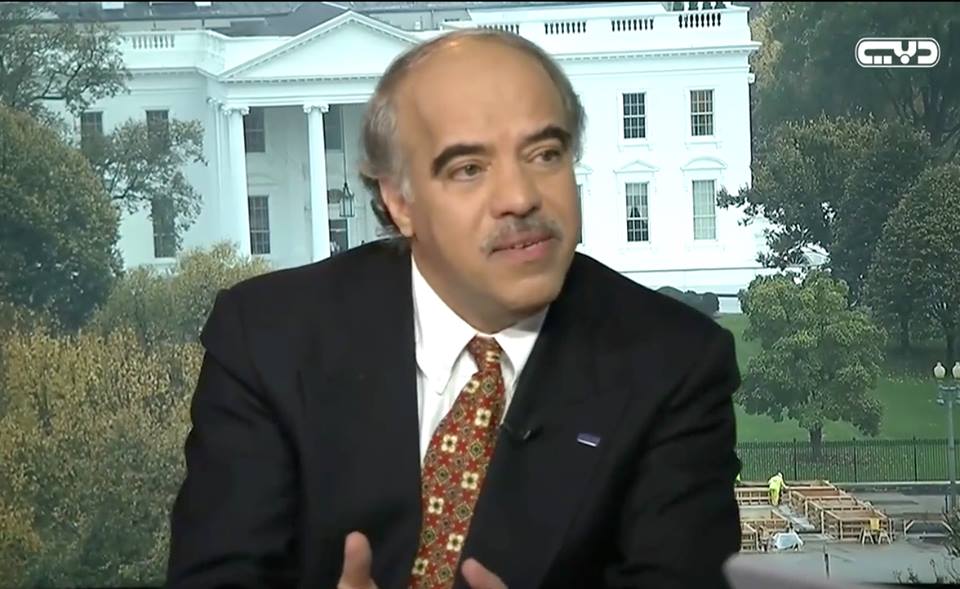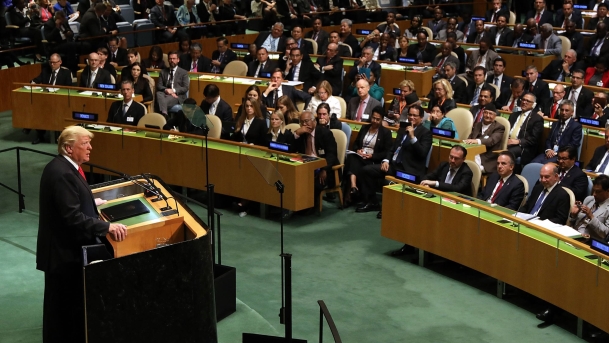
In his United Nations address and subsequent solo news conference in New York September 25, President Donald Trump made his most direct and unapologetic defense of his manifesto of anti-globalism and economic nationalism in plain populist language. He highlighted what he deemed as America’s choice of “independence and cooperation over global governance, control, and domination”, and asked the world community “to honor our sovereignty in return.”(1) Trump also announced his rejection of “the ideology of globalism” and acceptance of “the doctrine of patriotism.”(2) His blurry line between patriotism and nationalism can be misleading. His disconnect with the rest of the world, even with his close allies was extravagant during his address at the General Assembly. Trump also used the UN platform to brag about how “America’s economy is booming like never before. Since my election, we’ve added $10 trillion in wealth. The stock market is at an all-time high in history, and jobless claims are at a 50-year low.”(3) This claim cannot be taken without a grain of salt; and would be contested by fact-checking teams, which have increased in various media institutions and think tanks across America. Trump has made 4229 false or misleading claims in 558 days in his 19 months in office, according to the Washington Post.(4) The political establishment and most Congressional leaders in Washington remain skeptical of America’s current standing in the world.
The question remains why Trump continues to hold on to his political stubbornness and ideological opaqueness amidst growing decline of his popularity. He vehemently ignores his critics’ arguments inside and outside the United States. How does he formulate his discourse of anti-globalism and anti-globalization? Who is the new driving force of the anti-globalization movement, which emerged among the left in 1980s with the aim of defending the global South? Ironically, Trump adopted a populist discourse by expressing solidarity, once again, with the ’forgotten man’, a key point in the inauguration speech he delivered as the footsteps of the Congress January 20, 2018. Now at the UN podium, he declares his pledge “not to allow our workers to be victimized, our companies to be cheated, and our wealth to be plundered and transferred.”(5) This anti-globalist discourse seems to expand on his rhetoric against the political establishment in Washington.
Still, what is unclear is the socio-economic and historical undercurrents of such a contested vision, if we consider the correlation between Trump’s success and the rise of the extreme right movement, known as ‘the Alt-Right’, in pushing for an exclusive White America under the banner of ‘Making America Great Again’. One can assert his anti-global white nationalistic views did not grow in a vacuum. Still, the main threat to America’s democracy has come from its Electoral College institution and its own democratic game, as a déjà-vu scenario that emerged in some parts of Europe in 1930s.
Historically, there were certain elements of transformation inside the United States, both state and society, which were guided by puritan values of responsibility and political correctness, either under Republican or Democratic administrations. However since Trump took office, the American political system had been derailed by a president who tends to ignore most of America’s ideals and defies its institutions, by imposing his subjective claims, such as ‘fake news’, ‘alternative facts’, and his grandiose construct of ‘principled realism’. He argued before world leaders gathering in New York, “America’s policy of principled realism means we will not be held hostage to old dogmas, discredited ideologies, and so-called experts who have been proven wrong over the years, time and time again. This is true not only in matters of peace, but in matters of prosperity.”(6) Trump sounded pragmatic in defending his achievement record. He claimed that in less than two years, “my administration has accomplished more than almost any administration in the history of our country. America’s — so true. (Laughter.) Didn’t expect that reaction, but that’s okay. (Laughter and applause.)” He has turned the table against himself in a revealing moment of history. Veteran analyst Robin Wright wrote, “In his stump speeches at home, Trump often laments that the United States is “the laughingstock of the world.” But, on Tuesday, he was.”(7)
At the White House, Trump’s aides sought to trumpet the ‘promise’ of his power-driven realism whose principles remain as ill-defined impulses. They made a wild claim that Trump returned to the United Nations, after his fiery language against North Korea and Iran in September 2017, “with a mountain of evidence for ‘peace through strength’.” With a stretch of imagination, they argued, “the bold diplomacy of the Trump Administration has diminished many of the threats the President cited that day, including the most critical ones from North Korea, Iran, and ISIS.”(8) These claims of triumphant Trumpism imply some over-stretched justification of Trump’s open-ended isolationist politics. One should remember Trump remains keen on preserving the support of his right wing and Evangelical base for a presidential bid in 2020. Most Americans have noticed the “signs of a growing disconnect between the leader of the world’s most powerful country and many of his peers on the international stage.”(9)
Withdrawing from the World
Trump’s inward vision of “America First”, devotion to belittling diplomacy and international institutions, and withdrawal from several multi-lateral treaties like the Iran Deal, Paris climate accord, NAFTA, Trans-Pacific Partnership (TPP), among other treaties, showcase his isolationist drive amidst the interconnectedness of globalization and world politics. He has often found himself at odds with the rest of world leaders, either at the last G7 summit in Canada last June, the World Economic Forum in Davos in January, and now at the 73rd session of the United Nations General Assembly (UNGA).
Trump has made several pledges for non-engaged, non-globalist, and non-committed America; and doubled down on his vision “America will always act in our national interest.”(10) He reminded the world community of his opposition to the U.N. Human Rights Council by withdrawing as “the only responsible course”, and characterized it as “a grave embarrassment to this institution [UN], shielding egregious human rights abusers while bashing America and its many friends.”(11) Trump also lambasted the International Criminal Court (ICC), which he perceives as an institution that has “no jurisdiction, no legitimacy, and no authority”; and vowed to never surrender America’s sovereignty to “an unelected, unaccountable, global bureaucracy.”(12)
Trump’s attack on ICC came two weeks after his national security adviser, John Bolton, told the Federalist Society in Washington D.C. that “the ICC holds perpetrators of the most egregious atrocities accountable for their crimes, provides justice to the victims, and deters future abuses.” However in practice, “the court has been ineffective, unaccountable, and indeed, outright dangerous.”(13) Bolton takes pride in leading the U.S. efforts internationally to protect Americans from the Court's unacceptable overreach, starting with un-signing the Rome Statute. He announced, “The United States will use any means necessary to protect our citizens and those of our allies from unjust prosecution by this illegitimate court.”(14) The protection of U.S. sovereignty was a key argument in Bolton’s and Trump’s addresses alike, coupled with the imperatives of national security and anti-immigration regulations. Trump sought to exploit the nuances of sovereignty to help undermine the world belief in international law, alliances, and diplomacy.
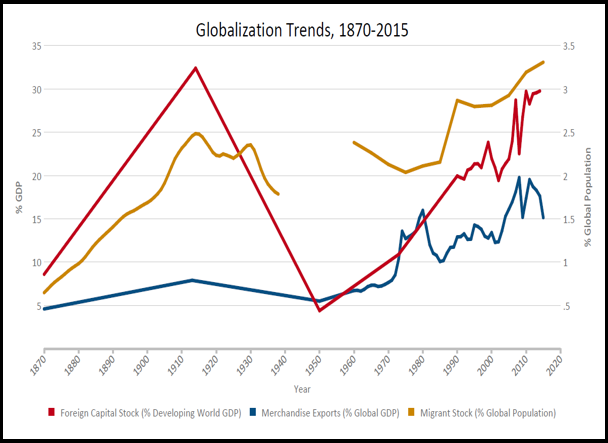 |
| [Brookings] |
Peddling Back to the 19th Century
Instead of solidifying world diplomacy and the promise of the United Nations, Trump sounded rather as an advocate of free style world politics. He favors states to go separate ways under the banner of protecting their sovereignty. He asserted, “America is governed by Americans”, and “it is up to the nations of the region to decide what kind of future they want for themselves and their children.”(15) The illusion of some unseen threats and the tone of fearmongering are the essence of his defense of individual state’s sovereignty instead of engineering innovative mechanisms to better secure world peace and stability. Instead, “responsible nations must defend,” as he put it, “against threats to sovereignty not just from global governance, but also from other, new forms of coercion and domination.”(16) Paradoxically, Trump implies leading realist theorist Hans Morgenthau’s fear of uncertainty in his reconstructed politics among nations; “To search for the clue to foreign policy exclusively in the motives of statesmen is both futile and deceptive. It is futile because motives are the most illusive of psychological data, distorted as they are, frequently beyond recognition, by the interests and emotions of actor and observer alike.”(17)
According to Trump, “America’s policy of principled realism means we will not be held hostage to old dogmas, discredited ideologies, and so-called experts who have been proven wrong over the years, time and time again.”(18) Ironically, this vision ushers to the pre-League of Nations and pre-United Nations eras, over a century ago, when states were fighting for their survival, and ended up waging two world wars and numerous proxy wars throughout the twentieth century. His aim is to undo the accomplishments of the liberal left in correcting the misdeeds of power politics over the last hundred years. He favors a quasi-wild-west culture in reconstructing international relations, where nations should not adhere to the conventional wisdom of a world community and the pursuit of collective peace and security. Instead, he aims at pursuing America’s self-defense persistence, and survival, and celebrating American exceptionalism, two common themes in the so-called ‘American Frontier’ culture. In their book “The American West: A New Interpretive History”, Robert Hine and John M. Faragher wrote, "frontier history tells the story of the creation and defense of communities, the use of the land, the development of markets, and the formation of states. It is a tale of conquest, but also one of survival, persistence, and the merging of peoples and cultures that gave birth and continuing life to America.”(19)
Trump’s resurrection of the American Frontier claim of power is evident in the way he targeted Iran in particular, which he labelled as ‘the world’s leading sponsor of terrorism.’ He vowed not to “allow a regime that chants “Death to America,” and that threatens Israel with annihilation, to possess the means to deliver a nuclear warhead to any city on Earth. Just can’t do it.”(20) his Trumpist characterization of the conflict with Tehran implies some ‘moral duty’ to intervene as Trump decided to “re-impose hard-hitting nuclear sanctions that had been lifted under the Iran deal. Additional sanctions will resume November 5th, and more will follow.”(21) His notion of ‘principled realism’ did not stop at what Washington should or should not do vis-à-vis the Iranians, but shifted to a call for global action to isolate the Iranian regime. Trump’s devotion to the respect of state sovereignty suddenly was off the table as he asked all nations “to support Iran’s people as they struggle to reclaim their religious and righteous destiny.”(22)
Sovereignty: A Tree that hides the Forest
The advocacy of the respect of sovereignty, as a central theme in Trump’s UN address, seems to overshadow his opposition to a worldview or common strategy on how to address the growing crisis of refugees and asylum seekers, as an outcome of several civil wars in Syria, Iraq, Yemen, Libya, and other conflict zones. He anticipates the exercise of individual state sovereignty would drop the moral and humanitarian responsibility of nations as he slammed the door against the arrival of Syrian refuges in the United States since he took office. He announced his administration would not join the new Global Compact on Migration (23), one of the major upcoming achievements of the United Nations.
In Trump’s UN address, there is more than one contradiction. He has rejected ICC as a legal mechanism of prosecuting war criminals, and contested of the U.N. Human Rights Council that monitors abuses in various countries, all under the auspices of the United Nations. These safeguards have helped promote accountability, governance, and respect of sovereignty. Without such institutions, the world community would not be able to tackle the very challenges he cited in his address, notably America’s independence from “the encroachment of expansionist foreign powers.”
Another challenge is Illegal immigration, which he blames for “funding criminal networks, ruthless gangs, and the flow of deadly drugs. Illegal immigration exploits vulnerable populations, hurts hardworking citizens, and has produced a vicious cycle of crime, violence, and poverty.”(24) While about 3000 families with no legal residence are still captive or deported by the homeland security department, Trump sought to find some resonance by linking individual nation’s own immigration policy to its national interests; “That is one reason the United States will not participate in the new Global Compact on Migration. Migration should not be governed by an international body unaccountable to our own citizens.”(25)
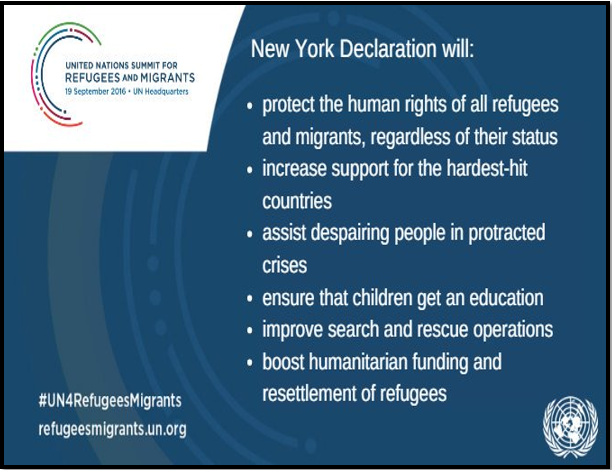 |
| [UN] |
In the Footsteps of Bismarck
Despite the United States is a remote fortress distant from the world and separated by two oceans in the east and west and a vast desert in the south, Trump sounded the alarm against possible foreign invasion. He articulated his typical realist fear to renew his commitment to “maintaining our independence from the encroachment of expansionist foreign powers. It has been the formal policy of our country since President Monroe that we reject the interference of foreign nations in this hemisphere and in our own affairs.”(26)
These isolationist measures may resonate with the right-wing communities and the American exceptionalism camp. Some observers like Stephen Walt have noticed several similarities between Trump and the last Hohenzollern emperor: Kaiser Wilhelm I. The two men have a lot in common in terms of insecurity and lack of discipline, as well as Wilhelmine Germany and the contemporary United States in terms of excessive military force, marginalization of diplomacy, exaggeration of threats, and the “inability to get their finances in order.”(27)
Still, Trump seems to be closer to Minister President of Prussia and first German Chancellor Otto von Bismarck (1815 – 1898) in two similarities: their devotion to power and their solidification of their respective nationalism. While following Trump’s UN speech, one could sense the vibrations of the famous “Iron and Blood” speech delivered by Bismarck at the Prussian Chamber of Deputies September 30, 1862. He stated, “Prussia must concentrate and maintain its power for the favorable moment which has already slipped by several times. Prussia's boundaries according to the Vienna treaties are not favorable to a healthy state life.”(28)
From a comparative perspective of history, Trump can be perceived as the loyal grandson of Bismarck who is known for engineering the diplomacy of realpolitik. One can detect some similarities in terms of maneuvering their way up in politics. In his meticulous biography “Bismarck: A Life”, Jonathan Steinberg wrote, “He [Bismarck] played his parts with perfect self-confidence, yet mixed them with rage, anxiety, illness, hypochrondria, and irrationality… He used democracy when it suited him, negotiated with revolutionaries and the dangerous Ferdinand Lassalle, the socialist who might have contested his authority.”(29)
Trump urged the world to let Americans “choose a future of patriotism, prosperity, and pride. Let us choose peace and freedom over domination and defeat.”(30) He does not shy away from flip-flopping in his positions and appearing with his foes in Singapore and beyond. Between UNGA 2017 and UNGA 2018, Trump has shifted his rhetoric vis-à-vis ‘Rocket Man’ of North Korea. He has also sent eight suggestions to Tehran to meet with Iranian President Rouhani amidst the open-ended escalation of the new conflict.
Critiquing Trump
In his UN address, soft-spoken French President Emmanuel Macron, who developed a warm personal relationship with Trump, was straightforward in rebuffing Trump’s drive for realpolitik and the promise of “Great America” at the expense of other nations. He stated, “I do not believe in a survival-of-the-fittest approach even if it were disguised as some form of legitimacy, when in reality it has lost any kind of legality.”(31) Moreover, Macron pointed to the demise of Capitalism from within and the struggle of the nation-state system. He concluded the emergence of what he termed as “deep crisis of the Westphalian liberal world order that we have known. Firstly, because it has failed in part to regulate itself. Its economic, financial, environmental and climate-related failings have not yet been satisfactorily resolved.”(32)
Macron also indicated clear rejection of the Trump’s America-led transatlantic alliance. He acknowledged that “the path of unilateralism leads us directly to withdrawal and conflict, to widespread confrontation between everyone, to the detriment of all - even, eventually, of those who believe they are the strongest.” One of the subtle points Macron highlighted during his address was his assertion "no leader is forever," as a clear hint that Europe is no longer receptive of Trump’s controversial impulses. Similarly, UN Secretary General, António Guterres, was blunt in his criticism of Trump’s anti-globalist tendencies, and warned, “Our world is suffering from a bad case of trust deficit disorder… Trust in global governance is also fragile.” Guterres expressed concern that the international community is facing “a set of paradoxes: the world is more connected, yet societies are becoming more fragmented.”(33)
Once again, Trump found himself isolated from the rest of the world. Prior to his speech, the president of the General Assembly, María Fernanda Espinosa Garcés, reminded him and other world leaders of how “we live in an interconnected world leaving us no choice to pursue a global dialogue.” However, Trump was disinterested in dialogue and called for more sanctions and other escalatory measures against Iran and Venezuela. He put more emphasis on sovereignty and independence of nations to do as they please to the extent of turning the UN system obsolete.
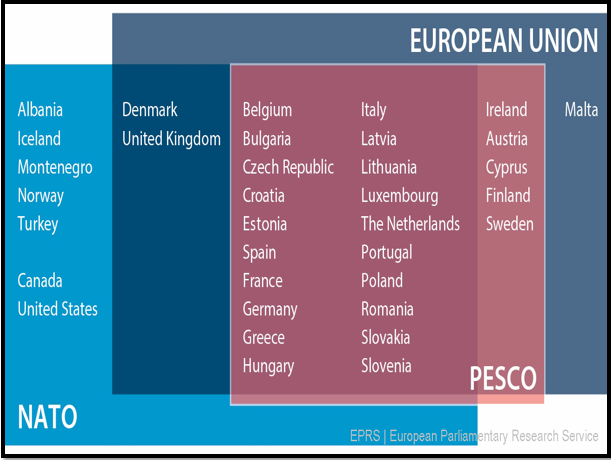 |
| [EPRS] |
The Double-edge of Trump’s Nationalism
Trump’s UN address reflected a postmodern view of international politics despite the fact he has emerged from one of the most heavily guarded constitutional systems in the world. His attack on globalism perpetuates his nationalistic war on the political establishment, the judiciary, the media, intellectuals, and all critical civil society. His notions of ‘sovereignty’, ‘patriotism’, and other loaded concepts could be misleading. They are the selling points of his agenda of nationalism and economic protectionism.
During my lecture before the Council of Europe in Strasbourg last summer, I argued for some contextualization of Trump’s major theme of economic nationalism to help deconstruct the socio-economic structure vis-à-vis his own political agency. Candidate and president Trump capitalized on the disgruntled collective mood of deep America, mainly rural and industrial red states, to solidify his nationalism, populism, and anti-establishment impulses. He took workers’ social and economic ills produced as much by Democrats as by Republicans, and “fed them through a racial grinder to make his alt-white sausage. He created an identity that a majority of the white working class and middle class flocked to. It is racist, but it’s not fixed. And much of this failure to retain a majority of the white working class in the Democratic Party lays with organized labor, which does little organizing beyond get-out-the-vote and contract negotiation campaigns.”(34)
By adopting the new economic formula of his main advisor Steve Bannon, Trump wants massive domestic deregulation, corporate tax cuts, infrastructure and defense spending, and high protectionist barriers to importing goods, services, and people.(35) Other countries will respond with measures that hurt American exports as well, but I don’t think this bothers Trump’s White House team one little bit. When Peter Navarro talks about deglobalizing America’s manufacturing supply chain, you know you’re in for an administration that wants to radically reshape the American economy. However, several economic analysts have contested the promise of this economic nationalism. Stuart Anderson Executive Director of the National Foundation for American Policy argues it is not a real economic theory that explains how markets function in a global economy. It is instead a set of political arguments aimed at blaming foreigners for America’s problems. In sum, “economic nationalism” equals economic nonsense. (36)
Researchers have gone back to the works of sociologist William G. Sumner who coined the term “forgotten man” when he published his political essay “What the Social Classes Owe to Each Other” near the dawn of the Progressive Era (1890s-1920s). He lamented the lost autonomy of hard-working citizens suddenly forced to pay for high-flown programs of social reform. (37) Trump adopted this social prototype and put it back into political circulation in 2016 as a gesture of solidarity with the old ways of thinking about the “silent majority” and the “forgotten American.” And though he included “men and women” in his victory speech, Trump’s campaign mobilized around the same image that once animated the Roosevelt coalition: the “forgotten” white working-class man. (38)
Yale historian Beverly Cage proposes an interesting reflection about the centrality of this social category as she argues, “this essential political idea — that a vast segment of the nation’s white citizens have been overlooked, or looked down upon — has driven every major realignment in American politics since the New Deal.”(39) Trump’s dark view of America and fear of the other has led to growing attachment to political and economic protectionism. Many American workers remain skeptical of several free trade agreements, including NAFTA with Mexico and Canada, and the trade imbalance with China, Japan, and Mexico.
The rise of Trump’s populism and nationalism was energized by the ‘Forgotten White Man’s’ vengeance against the political establishment in Washington. For the last twenty years, Republican leaders have sided with wealthy conservatives and Wall Street elite instead of formulating a pro-active strategy to help avoid the current rupture between the Party and the working class. As the Economist’s analyst Gideon Rachman noticed: “Nationalism and its sibling, protectionism, are both on the march—propelled by a rampant batch of populist politicians in the West.”(40) Trump’s popularity implies the failure of the Republican Party in containing the Tea Party as a rebellious movement against the elitist Republican policies. This social malaise seemed to be a déjà vu decline of deep America.
Back in 2010, Philosopher and linguist Noam Chomsky sensed some real trouble in America because of “the frustration, disillusionment, the justified anger and the absence of any coherent response.” He expressed concern about some growing socio-psychological trends since “the mood of the country is frightening. The level of anger, frustration, and hatred of institutions is not organized in a constructive way. It is going off into self-destructive fantasies.”(41) Chomsky offered a dark vision of America's future that was easily dismissed and was proved valid this year. He warned of the success a "charismatic figure" would have if one ran for office promising to cure society's ills, and listed elements of their campaign that would take them to power. The similarities to Trump are manifold and clear, from military force being exalted (Trump consistently heaps praise on the army and secret service) to the scapegoating of illegal immigrants”.(42)
Trump seems to be a living embodiment of the prototype of nationalism as suggested by leading nationalism critic George Orwell in his “Notes on Nationalism”. There are several parallels between Trump’s discourse of white nationalism and Orwell’s “three principal characteristics” of nationalist thought:
1. “Obsession. As nearly as possible, no nationalist ever thinks, talks or writes about anything except the superiority of his own power unit.” His special mission is to prove that his chosen nation is in all respects better than its rivals.
2. “Instability.” The content of the nationalist’s belief, and even the object of his devotion, is liable to change as circumstances do. “What remains constant in the nationalist is his own state of mind”—the relentless, reductive, uncompromising fervor. The point is to keep oneself always in a frenzied state concerning vicarious contests of honor, whether indulging in spasms of rage over perceived insults or in sadistic ecstasies celebrating some new triumph. It is the single-minded intensity that matters, not the ostensible cause.
3. “Indifference to Reality.” Nationalists achieve by instinct the kind of doublethink that the denizens of Airstrip One cultivated by conscious effort: “Nationalism is power hunger tempered by self-deception. Every nationalist is capable of the most flagrant dishonesty, but he is also—since he is conscious of serving something bigger than himself—unshakably certain of being in the right.” His fundamental belief, he feels sure, must be true; therefore, the facts will have to be made to fit it.(43)
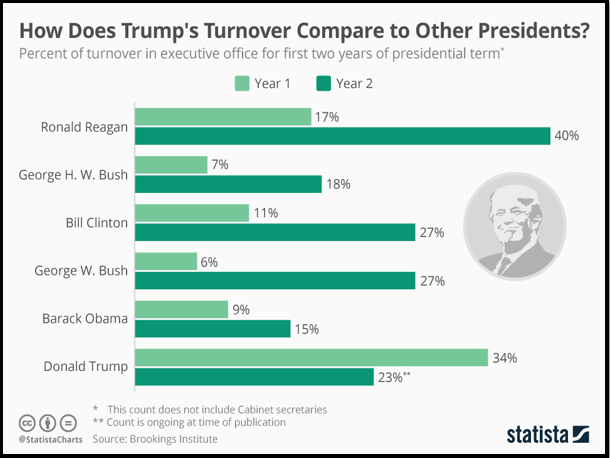 |
| [STATISTA] |
Conclusion: The Bigger Picture
One of the ironies in Trump’s UN speech is the shift of the anti-globalism and anti-globalization discourse. It originated among the liberal left, as were the demonstrations of the anti-globalization movement in Seattle in 1999 and Hamburg in 2017, with a particular emphasis on the Global South. However, it has become the objective of the Trumpist right-wing camp, with a particular emphasis on ‘America First”, not necessarily the Global North. The impact of globalization and free trade has become painful for a businessman-turned-president since the U.S. has over 3 million manufacturing jobs and the trade deficit ballooned to nearly $800 billion a year. Trump was clear in his populist discourse about globalization and asserted “America will never apologize for protecting its citizens.”(44)
While rejecting globalism, Trump has evidently stigmatized a well-celebrated virtue of engagement and collaboration among nations and international institutions. He has associated globalism with the negative connotations of ‘ideology’. This could be Trump’s new cold war against China, Iran, Europe, World Trade Organization, and even some of the Gulf allies since he no longer accept them as ‘free riders’ while benefiting from the U.S. protection of their national security. As he told Saudi King Salman after the UNGA, Trump expects the transfer of a sizable portion of the Saudi wealth to the United States.
Another irony is the interconnectedness between Trump’s attack on globalism and globalization and the ethno-nationalist and nativist undercurrents of his protectionism. There is a latent identity war between a shrinking white-Anglo-Saxon-Protestant majority and growing minorities. Latinos are expected to become the new majority in the United States by 2025. In his populism, or “defending the people” motto, Trump has used a simplified and fiery language beyond political correctness and the nuances of the public discourse. Most Trump’s base are white conservatives with a dominant European ancestry, and the least representative of the multi-racial and colored America. They have been uncomfortable with the current demographic shift with one million new immigrants settling in America every year. They also remain concerned with the growth of the Latino communities as the new majority by 2025. The decline of a US membership of the Migration Impact
Trump’s call for patriotism, or precisely nationalism, is not innocent; it hides a deliberate ideological exploitation of the gap between the political elite in Washington and ordinary Americans. It is also an extension to his demagogy in playing the card of identity politics. It builds on his nativist preference, which was one of the precursors of the Tea Party, as a renewal movement of the Republican Party in 2009. Trump’s speech showcased the radicalization of the public discourse in a society which was always made by immigrants from different geographies, religions and ethnicities. However, Trump’s electoral success gave momentum to the extreme right to flirt with Neo-Nazism in America.
As Trump’s motto “Make America Great Again” echoes the loss of the old good days, it projects a mythical past to which WASP America must return. Populism, nativism, Islamophobia, Hispanophobia, and now anti-globalism, as a justification of his nationalistic impulses, represent various roads that lead to one destination: the White Republic or the resurrection of the new world of WASP.
[Video]
(1) The White House, “Remarks by President Trump to the 73rd Session of the United Nations General Assembly - New York, NY”, September 25, 2018 https://www.whitehouse.gov/briefings-statements/remarks-president-trump-73rd-session-united-nations-general-assembly-new-york-ny/
(2) The White House, “Remarks by President Trump to the 73rd Session of the United Nations General Assembly - New York, NY”, September 25, 2018 https://www.whitehouse.gov/briefings-statements/remarks-president-trump-73rd-session-united-nations-general-assembly-new-york-ny/
(3) The White House, “Remarks by President Trump to the 73rd Session of the United Nations General Assembly - New York, NY”, September 25, 2018 https://www.whitehouse.gov/briefings-statements/remarks-president-trump-73rd-session-united-nations-general-assembly-new-york-ny/
(4) Glenn Kessler, Salvador Rizzo and Meg Kelly, “President Trump has made 4,229 false or misleading claims in 558 days”, The Washington Post, August 1, 2018 https://www.washingtonpost.com/news/fact-checker/wp/2018/08/01/president-trump-has-made-4229-false-or-misleading-claims-in-558-days/?utm_term=.b32b4d26561e
(5) The White House, “Remarks by President Trump to the 73rd Session of the United Nations General Assembly - New York, NY”, September 25, 2018 https://www.whitehouse.gov/briefings-statements/remarks-president-trump-73rd-session-united-nations-general-assembly-new-york-ny/
(6) The White House, “Remarks by President Trump to the 73rd Session of the United Nations General Assembly - New York, NY”, September 25, 2018 https://www.whitehouse.gov/briefings-statements/remarks-president-trump-73rd-session-united-nations-general-assembly-new-york-ny/
(7) Robin Wright, “Trump’s Speech at the U.N. Triggers Laughter—and Disbelief”, The new Yorker, September 25, 2018 https://www.newyorker.com/news/news-desk/trumps-speech-at-the-un-triggers-laughterand-disbelief
(8) The White House, “President Trump returns to the United nations with a mountain of evidence for ‘peace through strength’”, May 25, 2018 https://www.whitehouse.gov/
(9) Robin Wright, “Trump’s Speech at the U.N. Triggers Laughter—and Disbelief”, The new Yorker, September 25, 2018 https://www.newyorker.com/news/news-desk/trumps-speech-at-the-un-triggers-laughterand-disbelief
(10) The White House, “Remarks by President Trump to the 73rd Session of the United Nations General Assembly - New York, NY”, September 25, 2018 https://www.whitehouse.gov/briefings-statements/remarks-president-trump-73rd-session-united-nations-general-assembly-new-york-ny/
(11) The White House, “Remarks by President Trump to the 73rd Session of the United Nations General Assembly - New York, NY”, September 25, 2018 https://www.whitehouse.gov/briefings-statements/remarks-president-trump-73rd-session-united-nations-general-assembly-new-york-ny/
(12) The White House, “Remarks by President Trump to the 73rd Session of the United Nations General Assembly - New York, NY”, September 25, 2018 https://www.whitehouse.gov/briefings-statements/remarks-president-trump-73rd-session-united-nations-general-assembly-new-york-ny/
(13) John Bolton, “Full text of John Bolton's speech to the Federalist Society”, Aljazeera, September 10, 2018 https://www.aljazeera.com/news/2018/09/full-text-john-bolton-speech-federalist-society-180910172828633.html
(14) John Bolton, “Full text of John Bolton's speech to the Federalist Society”, Aljazeera, September 10, 2018 https://www.aljazeera.com/news/2018/09/full-text-john-bolton-speech-federalist-society-180910172828633.html
(15) The White House, “Remarks by President Trump to the 73rd Session of the United Nations General Assembly - New York, NY”, September 25, 2018 https://www.whitehouse.gov/briefings-statements/remarks-president-trump-73rd-session-united-nations-general-assembly-new-york-ny/
(16) The White House, “Remarks by President Trump to the 73rd Session of the United Nations General Assembly - New York, NY”, September 25, 2018 https://www.whitehouse.gov/briefings-statements/remarks-president-trump-73rd-session-united-nations-general-assembly-new-york-ny/
(17) Hans J. Morgenthau, Politics Among Nations: The Struggle for Power and Peace, Fifth Edition, Revised, (New York: Alfred A. Knopf, 1978, pp. 4-15
(18) The White House, “Remarks by President Trump to the 73rd Session of the United Nations General Assembly - New York, NY”, September 25, 2018 https://www.whitehouse.gov/briefings-statements/remarks-president-trump-73rd-session-united-nations-general-assembly-new-york-ny/
(19) Hine, Robert V.; John Mack Faragher, The American West: A New Interpretive History. Yale University Press, 2000, p. 10
(20) The White House, “Remarks by President Trump to the 73rd Session of the United Nations General Assembly - New York, NY”, September 25, 2018 https://www.whitehouse.gov/briefings-statements/remarks-president-trump-73rd-session-united-nations-general-assembly-new-york-ny/
(21) The White House, “Remarks by President Trump to the 73rd Session of the United Nations General Assembly - New York, NY”, September 25, 2018 https://www.whitehouse.gov/briefings-statements/remarks-president-trump-73rd-session-united-nations-general-assembly-new-york-ny/
(22) The White House, “Remarks by President Trump to the 73rd Session of the United Nations General Assembly - New York, NY”, September 25, 2018 https://www.whitehouse.gov/briefings-statements/remarks-president-trump-73rd-session-united-nations-general-assembly-new-york-ny/
(23) The White House, “Remarks by President Trump to the 73rd Session of the United Nations General Assembly - New York, NY”, September 25, 2018 https://www.whitehouse.gov/briefings-statements/remarks-president-trump-73rd-session-united-nations-general-assembly-new-york-ny/
(24) The White House, “Remarks by President Trump to the 73rd Session of the United Nations General Assembly - New York, NY”, September 25, 2018 https://www.whitehouse.gov/briefings-statements/remarks-president-trump-73rd-session-united-nations-general-assembly-new-york-ny/
(25) The White House, “Remarks by President Trump to the 73rd Session of the United Nations General Assembly - New York, NY”, September 25, 2018 https://www.whitehouse.gov/briefings-statements/remarks-president-trump-73rd-session-united-nations-general-assembly-new-york-ny/
(26) The White House, “Remarks by President Trump to the 73rd Session of the United Nations General Assembly - New York, NY”, September 25, 2018 https://www.whitehouse.gov/briefings-statements/remarks-president-trump-73rd-session-united-nations-general-assembly-new-york-ny/
(27) Stephen Walt, “The Donald Trump-Kaiser Wilhelm Parallels Are Getting Scary”, Foreign Policy, October, 12, 2017 https://foreignpolicy.com/2017/10/12/the-donald-trump-kaiser-wilhelm-parallels-are-getting-scary/
(28) Hollyday, F. B. M. “Bismarck. Great Lives Observed”, 1970, Prentice-Hall.
(29) Jonathan Steinberg “Bismarck: A Life”, Oxford University, 2012
(30) The White House, “Remarks by President Trump to the 73rd Session of the United Nations General Assembly - New York, NY”, September 25, 2018 https://www.whitehouse.gov/briefings-statements/remarks-president-trump-73rd-session-united-nations-general-assembly-new-york-ny/
(31) France Diplomatie, “United Nations General Assembly: Speech by President Emmanuel Macron (25 September 2018)https://www.diplomatie.gouv.fr/en/french-foreign-policy/united-nations/events/united-nations-general-assembly-sessions/unga-s-73rd-session/article/united-nations-general-assembly-speech-by-president-emmanuel-macron-25-09-18
(32) France Diplomatie, “United Nations General Assembly: Speech by President Emmanuel Macron (25 September 2018)https://www.diplomatie.gouv.fr/en/french-foreign-policy/united-nations/events/united-nations-general-assembly-sessions/unga-s-73rd-session/article/united-nations-general-assembly-speech-by-president-emmanuel-macron-25-09-18
(33) Amanda Holpuch, “Rouhani condemns 'recklessness of some states for international values' – as it happened”, The Guardian, September 25, 2018 https://www.theguardian.com/world/live/2018/sep/25/trump-united-nations-latest-live-news-updates-un-general-assembly-north-korea-iran-?page=with:block-5baa321de4b072dfb217c585#block-5baa321de4b072dfb217c585
(34) A. Gupta, “Trump Won Because the Democratic Party Failed, Not Because the White Working Class Revolted”, In These Times, 11 November 2016 [Visited 12 November 2016] http://inthesetimes.com/article/19626/trump-won-because-the-democratic-party-failed-not-because-the-white-working
(35) Daniel W. Drezner, “Who benefits from Bannon’s economic nationalism?”, 7February 2017, The Washington Post https://www.washingtonpost.com/posteverything/wp/2017/02/07/who-benefits-from-bannons-economic-nationalism/?utm_term=.805f419a6520
(36) Stuart Anderson, “Economists Say 'Economic Nationalism' Is Economic Nonsense”, Forbes, 27 February 2017https://www.forbes.com/sites/stuartanderson/2017/02/25/economists-say-economic-nationalism-is-economic-nonsense/#67ae61ba306f
(37) B. Gage, “Who is the ‘Forgotten Man’?” The New York Times, 10 November 2016 http://www.nytimes.com/interactive/projects/cp/opinion/election-night-2016/the-democrats-deadly-error
(38) B. Gage, “Who is the ‘Forgotten Man’?” The New York Times, 10 November 2016 http://www.nytimes.com/interactive/projects/cp/opinion/election-night-2016/the-democrats-deadly-error
(39) B. Gage, “Who is the ‘Forgotten Man’?” The New York Times, 10 November 2016 http://www.nytimes.com/interactive/projects/cp/opinion/election-night-2016/the-democrats-deadly-error
(40) Gideon Rachman, Anti-globalists on the March,” The World in 2018, The Economist, http://www.theworldin.com/article/12633/anti-globalists-march?fsrc=scn/tw/wi/bl/ed/
(41) C. Hooton, “President Donald Trump wins: Noam Chomsky called this political moment 6 years ago”, Independent, 9 November 2016 (Visited 10 November 2016) http://www.independent.co.uk/arts-entertainment/donald-trump-president-wins-election-noam-chomsky-prediction-a7406831.html
(42) C. Hooton, “President Donald Trump wins: Noam Chomsky called this political moment 6 years ago”, Independent, 9 November 2016 (Visited 10 November 2016) http://www.independent.co.uk/arts-entertainment/donald-trump-president-wins-election-noam-chomsky-prediction-a7406831.html
(43) Kristian Williams, “What George Orwell Wrote about the Danger of Nationalism”, November 16, 2017 https://lithub.com/what-george-orwell-wrote-about-the-dangers-of-nationalism/
(44) The White House, “Remarks by President Trump to the 73rd Session of the United Nations General Assembly - New York, NY”, September 25, 2018 https://www.whitehouse.gov/briefings-statements/remarks-president-trump-73rd-session-united-nations-general-assembly-new-york-ny/
